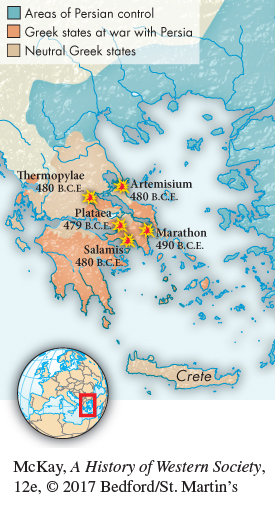A History of Western Society: Printed Page 72
A History of Western Society, Value Edition: Printed Page 69
A History of Western Society, Concise Edition: Printed Page 75
The Persian Wars

In 499 B.C.E. the Greeks who lived in Ionia unsuccessfully rebelled against the Persian Empire, which had ruled the area for fifty years (see Chapter 2). The Athenians had provided halfhearted help to the Ionians in this failed rebellion, and in 490 B.C.E. the Persians retaliated against Athens, only to be surprisingly defeated by the Athenian hoplites at the Battle of Marathon. (According to legend, a Greek runner carried the victory message to Athens. When the modern Olympic games were founded in 1896, they included a long-
In 480 B.C.E. the Persian king Xerxes I (r. 485–465 B.C.E.) personally led a massive invasion of Greece. Under the leadership of Sparta, many Greek poleis, though not all, joined together to fight the Persians. The first confrontations between the Persians and the Greeks occurred at the pass of Thermopylae (thuhr-
At the same time as the land battle of Thermopylae, Greeks and Persians fought one another in a naval battle at Artemisium off Boeotia. The Athenians, led by the general Themistocles, provided the heart of the naval forces with their fleet of triremes, oar-
The wars provided a brief glimpse of what the Greeks could accomplish when they worked together. By defeating the Persians, the Greeks ensured that they would not be ruled by a foreign power. The decisive victories meant that Greek political forms and intellectual concepts would be handed down to later societies. Among the thoughtful Greeks who felt prompted to record and analyze these events was Herodotus, who traveled the Greek world to piece together the rise and fall of the Persian Empire. Like many other authors and thinkers, he was born elsewhere but moved to Athens and lived there for a time.